|
|
|
Sort Order |
|
|
|
Items / Page
|
|
|
|
|
|
|
| Srl | Item |
| 1 |
ID:
092544


|
|
|
|
|
| Publication |
2009.
|
| Summary/Abstract |
Fieldwork advice has increased and improved over the years. Yet, the bulk of political science fieldwork advice is general; it assumes that the subject to whom advice is given is simply a political scientist-in training, perhaps-with no other salient identities that might intercede (but see Mazzei and O'Brien 2005 and the PS 2006 fieldwork symposium, The Methodologies of Field Research in the Middle East, for recent exceptions). Of course in reality it is not just the fieldwork setting that varies; the relationship of the researcher to the field matters a great deal-and that may be much more dependent on our specific identities than we have previously credited. It is not simply the subjects that we study, but us as well who have to negotiate sometimes sticky issues of race, class, gender, nationality, and so forth.
|
|
|
|
|
|
|
|
|
|
|
|
|
|
|
|
| 2 |
ID:
175713
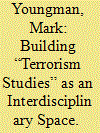

|
|
|
|
|
| Summary/Abstract |
Over the years, there have been many debates regarding the state of research into terrorism and whether “terrorism studies” constitutes an academic discipline in its own right. Such reflections, coupled with the natural evolution of what is still a relatively new area of research, have arguably led to significant improvements in quality and rigour. At the same time, the status of terrorism studies itself remains somewhat ambiguous: it is both discussed as a distinct field and simultaneously evades criticism by pointing to the difficulties of defining its boundaries. There are undoubtedly a number of advantages to forming a separate discipline, which would go some way to helping the field address some of the recurring problems that terrorism research faces. However, this article ultimately argues that scholars are better served by deliberately moving in the other direction and developing the field as a space for interdisciplinary engagement.
|
|
|
|
|
|
|
|
|
|
|
|
|
|
|
|
| 3 |
ID:
097886
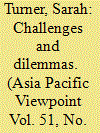

|
|
|
|
|
| Publication |
2010.
|
| Summary/Abstract |
The Chinese, Vietnamese and Lao spaces within the upland Southeast Asian massif, sheltering over 80 million people belonging to geographically dispersed and politically fragmented minority populations, have only recently reopened to overseas academic endeavours. Undertaking social sciences research there among ethnic minority groups is underscored by a specific set of challenges, dilemmas, and negotiations. This special issue brings together Western academics and post-fieldwork doctoral students from the realms of social anthropology and human geography, who have conducted in-depth fieldwork among ethnic minorities in upland southwest China, northern Vietnam, and southern Laos. The articles provide insights into the struggles and constraints they faced in the field, set against an understanding of the historical context of field research in these locales. In this unique context that nowadays interweaves economic liberalisation with centralised and authoritarian political structures, the authors explore how they have negotiated and manoeuvred access to ethnic minority voices in complex cultural configurations. The ethical challenges raised and methodological reflections offered will be insightful for others conducting fieldwork in the socialist margins of the Southeast Asian massif and beyond. This specific context is introduced here, followed by a critique of the literature on the core themes that contributors raise.
|
|
|
|
|
|
|
|
|
|
|
|
|
|
|
|
| 4 |
ID:
106701
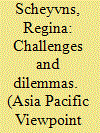

|
|
|
|
|
| Publication |
2011.
|
| Summary/Abstract |
The Chinese, Vietnamese and Lao spaces within the upland Southeast Asian massif, sheltering over 80 million people belonging to geographically dispersed and politically fragmented minority populations, have only recently reopened to overseas academic endeavours. Undertaking social sciences research there among ethnic minority groups is underscored by a specific set of challenges, dilemmas, and negotiations. This special issue brings together Western academics and post-fieldwork doctoral students from the realms of social anthropology and human geography, who have conducted in-depth fieldwork among ethnic minorities in upland southwest China, northern Vietnam, and southern Laos. The articles provide insights into the struggles and constraints they faced in the field, set against an understanding of the historical context of field research in these locales. In this unique context that nowadays interweaves economic liberalisation with centralised and authoritarian political structures, the authors explore how they have negotiated and manoeuvred access to ethnic minority voices in complex cultural configurations. The ethical challenges raised and methodological reflections offered will be insightful for others conducting fieldwork in the socialist margins of the Southeast Asian massif and beyond. This specific context is introduced here, followed by a critique of the literature on the core themes that contributors raise.
|
|
|
|
|
|
|
|
|
|
|
|
|
|
|
|
| 5 |
ID:
171298
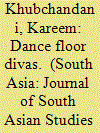

|
|
|
|
|
| Summary/Abstract |
Tracing his encounters with one particular song during fieldwork on queer nightlife in Bangalore, the author argues for the usefulness of ethnography as a critical method for studying dance and other modes of fun, play and pleasure in South Asia. He argues that ethnography’s many modes (co-performance, interview, observation, auto-ethnography) evidence how expressive practices integrate into the multiple strata of everyday life and political-economy, and how these cultural expressions facilitate inventions of new selves and worlds. While popular, improvised and social dances are challenging to study given their ephemerality, ethnography deepens our understanding of them and allows us to engage in creative dialogue in fieldwork.
|
|
|
|
|
|
|
|
|
|
|
|
|
|
|
|
| 6 |
ID:
106695
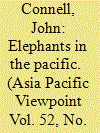

|
|
|
|
|
| Publication |
2011.
|
| Summary/Abstract |
The Chinese, Vietnamese and Lao spaces within the upland Southeast Asian massif, sheltering over 80 million people belonging to geographically dispersed and politically fragmented minority populations, have only recently reopened to overseas academic endeavours. Undertaking social sciences research there among ethnic minority groups is underscored by a specific set of challenges, dilemmas, and negotiations. This special issue brings together Western academics and post-fieldwork doctoral students from the realms of social anthropology and human geography, who have conducted in-depth fieldwork among ethnic minorities in upland southwest China, northern Vietnam, and southern Laos. The articles provide insights into the struggles and constraints they faced in the field, set against an understanding of the historical context of field research in these locales. In this unique context that nowadays interweaves economic liberalisation with centralised and authoritarian political structures, the authors explore how they have negotiated and manoeuvred access to ethnic minority voices in complex cultural configurations. The ethical challenges raised and methodological reflections offered will be insightful for others conducting fieldwork in the socialist margins of the Southeast Asian massif and beyond. This specific context is introduced here, followed by a critique of the literature on the core themes that contributors raise.
|
|
|
|
|
|
|
|
|
|
|
|
|
|
|
|
| 7 |
ID:
161135
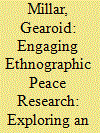

|
|
|
|
|
| Summary/Abstract |
As has been thoroughly rehearsed in the literature, the failures of the liberal peace model of post-conflict intervention have given rise to a ‘local turn’ in peace research. This in turn has refocused attention away from the motivations and practices of international actors towards local ownership and ‘buy-in’, and the importance of culture, context, and ‘the Everyday’. There is a mismatch, however, between the methodological skills among peace researchers today, and the new imperative to explore local and everyday understandings, perceptions, and experiences of conflict, transition, and peace. For this reason a number of scholars have recently emphasized the importance of incorporating ethnographic methods and an anthropological imagination into peace research. However, at this point, and as evidenced in the contributions to this special issue, there are many challenges to such incorporation which must be acknowledge and addressed if the ethnographic approach is to fulfil its early promise to add empirical substance to the local turn. The contributing authors each address different challenges to conducting Ethnographic Peace Research (EPR) in post-conflict contexts and, as this introduction argues, they evidence clearly the variety of questions yet to be answered while suggesting different ways ethnographic approaches can be incorporated into peace research.
|
|
|
|
|
|
|
|
|
|
|
|
|
|
|
|
| 8 |
ID:
123185
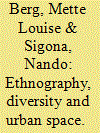

|
|
|
|
|
| Publication |
2013.
|
| Summary/Abstract |
This article is an introduction to a special issue on ethnography, diversity and urban space. It places the 'diversity turn' within studies of migration and multiculture historically and discusses the implications of concepts such as 'diversity' and more recently 'super-diversity' for scholarship, policy and identity politics. It argues that diversity is a helpful concept for studies of migration and multiculture because it avoids the essentialism and bias towards ethnic affiliation often characterising studies within the multiculturalism framework, while being more grounded locally than studies within the transnationalism framework. It examines the methodological implications of increasing diversity and complexity on ethnographic studies and the definition of the 'field'. It makes the point that increasing urban diversity poses a challenge to ethnographic ideals of 'immersion' and wholeness. Finally, it introduces the individual articles in the special issue.
|
|
|
|
|
|
|
|
|
|
|
|
|
|
|
|
| 9 |
ID:
097887


|
|
|
|
|
| Publication |
2010.
|
| Summary/Abstract |
The People's Republic of China (PRC) is increasingly open to foreigners undertaking social science fieldwork; yet obstacles remain. Working with ethnic minorities adds further complexities because of the sensitive topics such research may raise. Based on recent fieldwork among the Dong in southeast Guizhou, as the first foreign researcher to ask for and gain official permission to work in the region, this article exposes some of the challenges, both practical and methodological, of conducting research in the PRC. Gaining access to my field site was a long trek through the hierarchic maze of Chinese administration. While reflecting upon this process, I detail my negotiations with local authorities. I then examine how I found reliable statistical data, was able to access the voices of peasants, acted to protect the anonymity of dissident informants, and negotiated working with local research assistants once in the field. These aspects, in turn, highlighted the importance of considering positionality in the field. Although each person's experiences and routes to fieldwork are unique, there are recurrent issues that shape the research process in the PRC. I reflect upon a number of these here, in the hope that this can smooth the way for future researchers.
|
|
|
|
|
|
|
|
|
|
|
|
|
|
|
|
| 10 |
ID:
097893
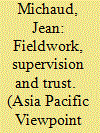

|
|
|
|
|
| Publication |
2010.
|
| Summary/Abstract |
In this research note I reflect upon my different experiences as a researcher with ethnic minorities in Southeast Asia, from my years as a postgraduate student to my current work as a professor. From being a graduate student, to supervising them, I have learned many lessons about graduate fieldwork. Nowadays, I pass these on to supervisees as best I can. I consider it my professional and personal duty to actively warn, inform and prepare young anthropologists about to leave for their masters' and doctoral field research in China, Vietnam and Laos about the field locations to which they are travelling, the political negotiations that they will need to undertake, and the cultural, economic and political differences they will encounter. I also stress that the anthropology that is played out in the field in socialist settings is not necessarily that which we read about in textbooks.
|
|
|
|
|
|
|
|
|
|
|
|
|
|
|
|
| 11 |
ID:
131797
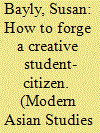

|
|
|
|
|
| Publication |
2014.
|
| Summary/Abstract |
The exaltation of achievement as a measure of collective and individual worth and moral agency has been one of the defining features of Asian developmentalism. Yet in today's age of globalized neoliberal attainment monitoring, the question of who and what an achiever actually is within an achievement-conscious society is far from straightforward or uncomplicated. In Vietnam, the notion of doing well and creditably for self and nation can be deeply problematic for those called upon, either officially or by living and ancestral kin, to embody qualities of attainment and creditable life-course functioning in ways recognizable to those who reward and monitor aspiring achievers. Building on recent fieldwork in Vietnam, this paper explores the ways young Hanoians have engaged with a rapidly changing set of ideas about how the country's tightly regulated schooling and examination system can both unleash and constrain the potential for new and 'creative' forms of attainment on the part of the nation's most promising and productive citizen-achievers.
|
|
|
|
|
|
|
|
|
|
|
|
|
|
|
|
| 12 |
ID:
172341


|
|
|
|
|
| Summary/Abstract |
This article proposes a method for analysing museums as sites of intimate and colonially-produced international relations. Beginning with fieldwork that approaches museums as sites through which people intimately encounter the objects, institutions, selves and others of international politics, we explore how intimacy can be ‘read’ as socio-sexual affect, scales and proximities, and colonial differentiation/racialisation. The article is grounded in fieldwork at the British Army Royal Engineers Museum in Kent, UK, conceptualised as an assembly of, following Stoler, imperial debris. We explore how certain museum exhibits work as intimate ‘organising objects’, locating the museum collection, and those who visit or are excluded from it, within the intimate circulations of imperial and colonial violence. The article makes two core contributions: first, responding to recent literature in IR on museums we propose a framework for understanding how museums and exhibitions function as everyday sites of coloniality and racialisation. Second, we propose that approaching intimacy as a method is instructive for fieldwork in international relations (including museums) which takes the colonial constitution of the global/local seriously.
|
|
|
|
|
|
|
|
|
|
|
|
|
|
|
|
| 13 |
ID:
192865
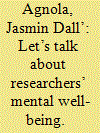

|
|
|
|
|
| Summary/Abstract |
Although mental health concerns among university populations are on the rise, discussions of academia-related trauma rarely occur in published outlets. They are usually limited to informal talks and the private exchange of anecdotes during conferences and workshops. This is problematic because accounts of how to mitigate stress, anxiety and depression in the academic environment are valuable for both early-career and senior researchers. In being honest about the strategies that I have developed to protect my mental well-being, both during my fieldwork in Central Asia and the academic environment more generally, I do not wish to make totalizing generalizations about researchers’ trauma experiences in our discipline. By contrast, I hope that my account presented here will invite further academic discussion about the possibility of academia-related trauma and its implications for scholars’ work and mental well-being.
|
|
|
|
|
|
|
|
|
|
|
|
|
|
|
|
| 14 |
ID:
177236


|
|
|
|
|
| Summary/Abstract |
Researchers discuss the logistics of successful fieldwork but not the mental health considerations that fieldwork and the research process introduce. Successful fieldwork and fruitful academic careers hinge on acknowledging and managing our mental health. We discuss peer-support networks, secondary trauma, coping skills, therapy, and researchers’ mental health options before, during, and after fieldwork.
|
|
|
|
|
|
|
|
|
|
|
|
|
|
|
|
| 15 |
ID:
097890


|
|
|
|
|
| Publication |
2010.
|
| Summary/Abstract |
In this article, I detail and evaluate the negotiations I had to broker to conduct ethnographic research on marketplace vendors and trade in the upland borderlands of northern Vietnam. Working with the analogy of the numerous 'lines' I was constrained by, had to manoeuvre around, and at times crossed over, I begin with a discussion of the 'official lines' or state regulations imposed upon my research and how I worked with, or negotiated these limitations. I then reveal the important 'border guards' or gatekeepers, such as local state actors and also field assistants, who enabled or constrained access to informants in numerous different ways. I also highlight the logistical and practical lines that I had to accept and indeed, often draw, to accomplish my study. I conclude with a consideration of how friendships in the field drew me beyond the lines I had originally drawn around my research. These relationships furthered my anxiety over the possibilities for conducting research that ultimately contributes towards social justice in a constrained political setting such as that which presently characterises Vietnam.
|
|
|
|
|
|
|
|
|
|
|
|
|
|
|
|
| 16 |
ID:
182939
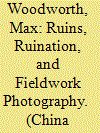

|
|
|
|
|
| Summary/Abstract |
This article offers a self-reflexive critique of ruins as method by examining side-by-side the production, circulation, and meaning-making processes around the ruin photography of ghost cities in China and the author’s own production of a fieldwork archive of the same photographed spaces. The ruin is commonly understood in recent scholarship to be a deeply ideological artefact with meanings contingent on class-inflected practices of ruin appreciation. In a similar vein, photography of urban ruins has been heavily criticised for allegedly aestheticising social ruin and economic decline. The critique of ruin photography as a practice of ideological claim-making or as a form of critical engagement merits scrutiny in light of this issue’s field research practices looking at ruins in China. More specifically, photography is a standard part of fieldwork, including the author’s. The aim of this article, then, is to ask how and why photographs of urban ruins in China differ across image-making practices? How are fieldwork photos of ruins, the kinds of photos that generate a data archive and are used in scholarly publications, resonant with other ideological claim-making purposes of ruin photography? How might we account for the political valences of image aesthetics when photographs are a vital part of scholarly efforts?
|
|
|
|
|
|
|
|
|
|
|
|
|
|
|
|
| 17 |
ID:
154071
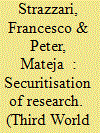

|
|
|
|
|
| Summary/Abstract |
Knowledge on conflict-affected areas is becoming increasingly important for scholarship and policy. This article identifies a recent change in knowledge production regarding 'zones of danger', attributing it not only to the external environment, but also to an on-going process of securitisation of research resulting from institutional and disciplinary practices. Research is increasingly framed by security concerns and is becoming a security concern in itself, although the implications are not readily acknowledged. To illustrate these developments, we draw on fieldwork in Mali and Darfur.
|
|
|
|
|
|
|
|
|
|
|
|
|
|
|
|
| 18 |
ID:
094702


|
|
|
|
|
| Publication |
2010.
|
| Summary/Abstract |
How should researchers treat questions of veracity when conducting interviews in settings rent by large-scale violence, such as war and genocide? To what extent should researchers trust narratives that are generated in politically sensitive contexts? The article argues that the value of narrative data does not lie solely in their truthfulness or accuracy; it also lies in the meta-data that accompany these testimonies. Meta-data are informants' spoken and unspoken thoughts and feelings which they do not always articulate in their stories or interview responses, but which emerge in other ways. This article identifies and analyzes five types of meta-data: rumors, inventions, denials, evasions, and silences. The article argues that meta-data are not extraneous to our datasets, they are data and should be viewed as integral to the processes of data collection and analysis. Meta-data indicate how conditions in the present shape what people are willing to say about violence in the past, what they have reason to embellish or minimize, and what they prefer to keep to themselves. Attending to meta-data is important for responding to informants' fears about talking to a researcher and to ensure informants' safety after the researcher leaves the field. It is also crucial for the robustness of researchers' theories and knowledge about political violence and other political phenomena. The article draws from the author's nine months of fieldwork in Rwanda in 2004, as well as the literature on conflict and violence from political science, anthropology, history, and sociology.
|
|
|
|
|
|
|
|
|
|
|
|
|
|
|
|
| 19 |
ID:
097892


|
|
|
|
|
| Publication |
2010.
|
| Summary/Abstract |
Given the increased attention in anthropology and human geography to the positionality and reflexivity of researchers completing fieldwork in foreign countries, it is surprising that we still know relatively little about how research assistants and interpreters are positioned in the field and their own concerns, constraints and coping mechanisms. This article, based on in-depth interviews with local interpreters/research assistants in Vietnam and China, working alongside Western doctoral students researching upland ethnic minority populations, provides space for the assistants' voices. While reflecting upon their own time in the field, we see how the positionalities of these individuals can have rather unexpected consequences. Furthermore, the assistants' analyses of particular events, as well as their take on the best way to proceed in specific circumstances can be at odds with that of their employers, and negotiated coping strategies have to be found. The article concludes with advice from these assistants regarding how future assistants can make the best of their position, and what foreign researchers need to consider in fostering constructive working relationships.
|
|
|
|
|
|
|
|
|
|
|
|
|
|
|
|
| 20 |
ID:
083845


|
|
|
|
|
| Publication |
2008.
|
| Summary/Abstract |
Emerging post-development literatures consider how post-structural and post-colonial critiques of development could form the basis for new kinds of development practices. Much of the search for such post-development possibilities draws on new theories of discourse. This paper considers the challenges of bringing together empirical research and the experience of doing development with the often ethereal and deeply speculative work of discourse theorists. I reflect on the course taken by my own research in Northern Thailand, and discuss the possibilities that can emerge as theory confronts empirics, and conceptual frameworks are transformed through the daily politics of fieldwork
|
|
|
|
|
|
|
|
|
|
|
|
|
|
|
|
|
|
|
|
|